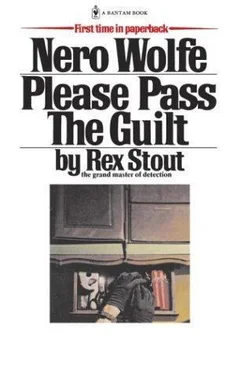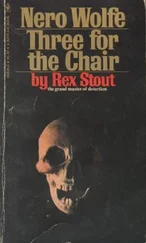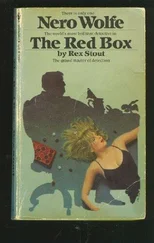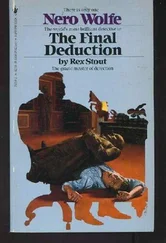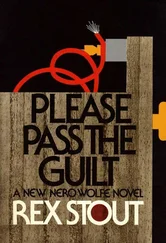Rex Stout - Please Pass the Guilt
Здесь есть возможность читать онлайн «Rex Stout - Please Pass the Guilt» весь текст электронной книги совершенно бесплатно (целиком полную версию без сокращений). В некоторых случаях можно слушать аудио, скачать через торрент в формате fb2 и присутствует краткое содержание. Жанр: Старинная литература, en-GB. Описание произведения, (предисловие) а так же отзывы посетителей доступны на портале библиотеки ЛибКат.
- Название:Please Pass the Guilt
- Автор:
- Жанр:
- Год:неизвестен
- ISBN:нет данных
- Рейтинг книги:3 / 5. Голосов: 1
-
Избранное:Добавить в избранное
- Отзывы:
-
Ваша оценка:
- 60
- 1
- 2
- 3
- 4
- 5
Please Pass the Guilt: краткое содержание, описание и аннотация
Предлагаем к чтению аннотацию, описание, краткое содержание или предисловие (зависит от того, что написал сам автор книги «Please Pass the Guilt»). Если вы не нашли необходимую информацию о книге — напишите в комментариях, мы постараемся отыскать её.
Please Pass the Guilt — читать онлайн бесплатно полную книгу (весь текст) целиком
Ниже представлен текст книги, разбитый по страницам. Система сохранения места последней прочитанной страницы, позволяет с удобством читать онлайн бесплатно книгу «Please Pass the Guilt», без необходимости каждый раз заново искать на чём Вы остановились. Поставьте закладку, и сможете в любой момент перейти на страницу, на которой закончили чтение.
Интервал:
Закладка:
"Only as a spectator. I am not involved and don't expect to be." Vollmer thanked him for the favor, not enthusiastically, and they hung up. Wolfe looked at the wall clock--five past ten-- and reached for his current book. Grant Takes Command, by Bruce Catton. I went to the hall and up the two flights to my room, to catch the last inning or two at Shea Stadium on television. 3 we keep both the Times and the Gazette for three weeks, sometimes longer, and even if the bank balance had been at a record high I would probably have had another go at the accounts of the Odell murder just for curiosity, since I had now met one of the cast of characters. But we needed a job. In the past five months, the first five of 1969, we had had only six cases, and the fee had gone to five figures in only one of them--getting a damn fool out of a nasty mess with a bunch of smoothies he should have been on to at the first contact. So the checking account balance had lost a lot of weight, and to meet the upkeep of the old brownstone, including the weekly payroll for Theodore and Fritz and me, by about the middle of July Wolfe would have to turn some documents into cash, and that should be prevented if possible. So it wasn't just curiosity that sent me to the basement Thursday morning for old newspapers. The murder was two weeks old, but what had happened, and how, had been plain and clear in the first reports and had not been substantially revised or amended. At 3:17 p.m. on Tuesday, May 20, a man named Peter J. Odell had entered a room on the sixth floor of the CAN building on West Fifty-fourth Street, pulled open the bottom drawer of a desk, and died instantly. The bomb that shredded him was so powerful that it not only blew the metal desk up to the ceiling but even buckled two of the walls. CAN stood for Continental Air Network, which occupied the whole building, and Peter J. Odell had been Please Pass the Guilt 13 its vice-president in charge of development. The room and desk were not his; they belonged to Amory Browning, the vice- president in charge of programming. All right, that was what happened, but in addition to the main question, who had put the bomb in the drawer, there were others that had still not been answered, at least not for publication. It wasn't unheard of for a vice-president to enter another vice-president's room, but why had Odell opened that drawer? That drawer. It was known to enough people at CAN to get into both the Times and the Gazette that that drawer had rarely, possibly never, been opened by anyone but Browning himself because nothing was kept in it but a bottle or bottles of twelve-year-old Ten-Mile Creek bourbon. It had almost certainly been known to Odell. No one had admitted seeing Odell enter Browning's room. Helen Lugos, Browning's secretary, whose room adjoined his, had been down the hall in a file room. Kenneth Meer, Browning's chief assistant, had been down on the ground floor in conference with some technicians. Browning himself had been with Cass R. Abbott, the president of CAN, in his office--the corner office on that floor. If anyone knew why Odell had gone to Browning's room, he wasn't saying. So the answer to the question. Who put the bomb in the drawer? depended partly on the answer to another question: Whom did he expect to open the drawer? Rereading the accounts in fifteen copies of the Times and fifteen of the Gazette, I was impressed by how well I had absorbed the details of an event we had not been involved in, and by nothing else. There was nothing to give me a nudge on a start of what I had in mind. It was after eleven o'clock when I finished, so Wolfe had come down from the plant rooms, and I went up to the phone in my room to dial a number--the switchboard of the Gazette. It was an afternoon paper and Lon Cohen's line was usually busy from 10 a.m. to 4:20 p.m., but 14 Please Pass the Guilt I finally got him. I told him I wanted thirty seconds and he said I could have five. "Then," I said, "I won't tell you about the steer that grew the Chateaubriands that Felix is saving for us. Can you meet me at Rusterman's at a quarter past six?" "I can if I have to. Bringing what?" "Just your tongue. And of course plenty of lettuce for later." The "later" meant the poker game at Saul Panzer's apartment which started at eight o'clock Thursday evenings. Lon made an appropriate retort about lettuce and hung up, and I dialed another number I didn't have to look up and got Felix, and told him that this time my request for the small room upstairs was strictly personal, not on behalf of Wolfe, and that if he was short on Chateaubriands, tornados would be fine. He asked what kind of flowers would be preferred, and I said my guest would be a man from whom I hoped to get some useful information, so instead of flowers make it four-leaf clovers for luck. An announcement to Wolfe that I wouldn't be there for dinner was not required, since I never was on Thursdays. Since his dinner time was 7:15, I couldn't eat at his table and be at Saul's poker table at eight. I merely mentioned casually, after we had finished with the morning mail, that I would be leaving around a quarter to six, before he came down from the plant rooms. I did not mention Kenneth Meer, and neither did he, but around the middle of the afternoon Vollmer phoned to say that Dr. Ostrow didn't want to know what Ronald Seaver's name was. Which of course was a polite lie. Dr. Ostrow would certainly have liked to know the name, but not from Wolfe if he had got it by a trick. The small room upstairs at Rusterman's had many memories for me, back to the days when Marko Vukcic was still alive and making it the best restaurant in New York, with frequent meals with his old friend Nero Wolfe helping to keep it the best. It was still better than good, as Lon Cohen remarked that evening after his third spoonful of Germiny & POseille, and Please Pass the Guilt 15 again after his second bite of Chateaubriand and his first sip of the claret. With about his fourth sip he said, "I'd be enjoying this more --or less, I don't know which--if I knew the price. Of course you want something, or Nero Wolfe does. What?" I swallowed meat. "Not Nero Wolfe. Me. He doesn't know about it and I don't want him to. I need some facts. I spent two hours this morning reading everything two great newspapers have printed about the murder of Peter J. Odell and I still don't know enough for my personal satisfaction. I thought a chat with you might be helpful." He squinted at me. "How straight is that? That Wolfe doesn't know you're feeding me." "As straight as from a ten to an ace." His eyes aimed about a foot above my head, as they often did when he was deciding whether to call or raise, stayed there while I buttered a bite of roll, and leveled down to mine. "Well, well," he said. "You could just put an ad in the Gazette. Of course with a box number since Wolfe mustn't know you're drumming." Just looking at Lon you would never guess, from his neat little face and his slick black hair, how sharp he is. But people who know him know, including the publisher of the Gazette, which is why he has a room to himself two doors down the hall from the publisher's room. I shook my head. "The kind of people I want to reach don't read Gazette ads. To be perfectly frank, I'm going stale and I need exercise. There must be plenty about that crowd that isn't fit to print. This room isn't bugged and neither am I. Have Cramer and the DA got a lead that they're saving?" "No." He forked peas. "Almost certainly not. Of course the hitch is that they don't know who the bomb was intended for." He put the peas where he wanted them. "Probably no one does but the guy who planted it. It's reasonable to suppose it was meant for Browning, but after all it was Odell who got it. A 16 Please Pass the Guilt fact is a fact. Did Browning plant it for Odell? He did have a motive." "Good enough?" "Apparently. Of course you know that Abbott is retiring the last of August and the board of directors was going to decide on his successor at a meeting scheduled for five o'clock that afternoon, and it would be either Browning or Odell. Odell certainly didn't plant the bomb for Browning and then open the drawer himself, but did Browning plant it and somehow get Odell to open it?" I sipped claret. "Of course your best men are on it, or have been. What do they think?" "They've quit thinking. All they have is guesses. Landry's guess is that Mrs. Browning put the bomb there for Helen Lugos, her husband's secretary, knowing, or thinking she knew, that Helen checked the bourbon supply every morning." "Did she? Check the bourbon supply every morning?" "I don't know and I doubt if Cramer does. Helen isn't speaking to reporters and it is said that she isn't wasting any words with the law. Also I don't know for sure that Helen and Browning were bedding, but Landry thinks he does. Ask Inspector Cramer, he may know. Another guess, Gahagan's, is that Odell was setting the bomb for Browning and fumbled it. He has been trying for a week to trace where and how Odell got the bomb. Perlman's guess is that Abbott did it because he thought they were going to pick Browning for the new president and he was for Odell. He has three theories on why Odell went to Browning's room and opened the drawer, none of them much good. Damiano's guess is that Helen Lugos did it, to get Browning, but he is no better than Permian on why Odell homed in." "Why would Helen want to get Browning?" "Sex." "That's not responsive." "Certainly it's responsive. When sex comes in by the window, logic leaves by the door. When two people collaborate Please Pass the Guilt 17 sexually, either one is capable of doing anything and nobody can be sure he knows why he did it. I think Damiano's guess is based on something a man named Meer, Kenneth Meer, told him. Meer is Browning's chief of staff. Damiano got him talking the day after it happened--they had been choir boys together at St. Andrew's--and Meer said that anyone who wanted to know how it happened should concentrate on Helen Lugos. Of course Damiano kept at him then, but Meer backed off. And as I said, Helen isn't doing any talking." "Has Damiano told Inspector Cramer what Meer said?" "Of course not. He didn't even tell us until a couple of days ago. He was hoping to earn a medal." "Does anybody guess that Meer did it?" "No one at the Gazette does. Naturally he has been considered, everybody has, but even for a wild guess you've got to have a motive. Meer certainly wouldn't have wanted to get Browning; if Browning is made president, Meer will be right up near the top. And how could he have got Odell to go to Browning's room and open that drawer? Of course guesses are a dime a dozen. If the bomb was intended for Browning, there are at least a dozen possible candidates. For instance, Made- line Odell, now the widow Odell. She had been expecting her husband to be the CAN president ever since she married him, twenty years ago, and it looked as if Browning was going to get it instead. Or Theodore Falk, the Wall Street Falk, old friend of the Odells and a member of the CAN board of directors. Of course he didn't do it himself, but millionaires don't have to do things themselves. Or Sylvia Venner. You know?" I nodded. " "The Big Town.'" "Right. She had that program for two years and Browning bounced her. Now she does chores, and she hates Browning's guts. I could name more. Of course if the bomb was intended for Odell, there are candidates for that too, but for them there's the problem of getting Odell to enter that room and open that drawer." 18 Please Pass the Guilt I swallowed my last bite of Chateaubriand and pushed the button for Pierre. "You said Odell's wife had been expecting him to be president ever since she married him. Had she been doing anything about it?" "Plenty. She inherited a big block of CAN stock from her father, Carl Hartig, along with a lot of oil wells and miscellaneous items, and she's been on the board of directors for ten years. She would probably have given half of her seventy or eighty million to have Browning removed from competition, but if she had known that bomb was in that drawer she would have made damn sure that her husband wouldn't go near that room that day. That's why she's not my guess--or anybody else's as far as I know." "Seventy or eighty million?" "At least that. She's really loaded." "Huh. What kind of sauce do you want on your souffle? Brandy ginger or mocha rum?" "Mocha rum sounds better." Pierre had come and was removing empty dishes. I told him what we would have and waited until he was gone to resume with Lon. You never know. Abbott or Browning or Madeline Odell might be one of Pierre's pet customers. When, at a quarter to eight, out on the sidewalk, we decided to walk the eleven blocks to Saul Panzer's instead of scouting for a taxi, I had collected around a hundred more facts and guesses, but it would be a waste of paper and ink to list them for you since none of them was any help to my program. Also I will not report on the course of events at the poker table, except to say that having a complicated operation on my mind was no help to my wallet. I lost sixty-eight bucks. 4 the first problem was how to get to her, and the second one was what to say when I did. "Her" was of course Madeline Odell, the widow. She was almost certainly in the clear on the bomb, she had the best reason for wanting the bomber to be caught and nailed, and she had the biggest stack. It was those two problems trying to take over that had caused me to make three big mistakes and several small ones at the poker game, and cost me money. They did not keep me from getting a good eight hours' sleep, nothing ever does, and they didn't affect my appetite at breakfast, but I skipped things in the Times that I usually cover, and I guess I was short with Fritz. In the office I actually forgot to put fresh water in the vase on Wolfe's desk. I still hadn't decided at lunchtime. Of course any one of a dozen dodges would have got me to her; no one is inaccessible if you put your mind on it; but then what? If possible the approach should lead naturally to the proposition. After lunch I went for a walk with a couple of unnecessary errands for an excuse, and didn't get back until after four o'clock, so Wolfe was up in the plant rooms and I had the office to myself. I swung the typewriter around and rolled paper in and gave it a try. Dear Mrs. Odell: This is on Nero Wolfe's letterhead because I work for him and am writing it in his office, but it is strictly personal, from me, and Mr. Wolfe doesn't know I am writing you. I do so because I am 20 Please Pass the Guilt an experienced professional detective and it hurts me to see or read about poor detective work, especially in an important case like the murder of your husband. Mr. Wolfe and I have of course followed the published accounts of the investigation, and yesterday he remarked to me that apparently the most crucial fact was being ignored, or at least not getting the priority it deserved, and I agreed with him. Such a criticism from him to the police or the District Attorney would probably have no effect, but it occurred to me this morning that it might have some effect if it came from you. If you wish to reach me the address and telephone number are above. I read it over twice and made five improvements: I took out "strictly" and "professional," changed "poor" to "inferior," "crucial" to "important," and "priority" to "attention." I read it again, changed "an important case like" to "such a vital case as," typed it on a letterhead with two carbons, signed it, and addressed an envelope to a number on East Sixty-third Street. I went to the kitchen to tell Fritz I was going out for air, and walked to the post office on Eighth Avenue. Since it was a Friday afternoon in June, it was possible, even probable, that she wouldn't get it until Monday, and nothing would interfere with my weekend pleasures at Shea Stadium, but a little after eleven o'clock Saturday morning, when Wolfe was dictating a long letter to an orchid collector in Malaysia, the phone rang and I swiveled and took it. "Nero Wolfe's office, Archie Goodwin speaking." A businesslike female voice: "This is Mrs. Peter Odell's secretary. She has received your letter and wishes to speak to Mr. Wolfe." Of course I had known that might happen, with Wolfe right there. "I'm sorry," I said, "but Mr. Wolfe isn't available and won't be until Monday. Anyway I made it clear that the letter was personal." Please Pass the Guilt 21 She covered the transmitter and I heard nothing. In a couple of minutes she was back: "Mr. Goodwin?" "Here." "Mrs. Odell wishes to see you. Will you be here promptly at three o'clock?" One of my basic opinions is that people who take things for granted should be helped to a better understanding of democracy, and at three o'clock it would be about the fourth inning, but I hadn't been asked to write that letter. "Yes," I said, "I'll be there," and hung up, and swiveled. "Someone using your name in vain," I told Wolfe. "People should read letters at least three times." I looked at my notebook. "The last I have is 'in spite of all the crosses hybridizers have tried.'" It took another full page of the notebook. My intention had been to get to Shea Stadium a little after one and enjoy a couple of hot dogs and a pint of milk while watching batting practice. Instead, I got to Sam's diner on Tenth Avenue a little after one and enjoyed rye bread and baked beans, two items that never appear at Wolfe's table, and then walked the nearly two miles from West Thirty-fifth Street to East Sixty-third. The people you see on midtown sidewalks Saturday afternoons are completely different from other days. It was a five-story, forty-foot-wide stone mansion, between Fifth and Madison, and I was stopped at the entrance to the vestibule by a broad-shouldered husky with a Lathrop Protective Service badge on his buttoned-up jacket. Apparently after more than two weeks, pests--for instance, journalists--were still a problem, or Mrs. Odell thought they were. He said grimly, "Well, sir?" I pronounced my name and said I was expected, and produced evidence of my identity from my card case. He entered the vestibule and pushed the button, and the door was opened by a woman in a neat gray uniform with a skirt that reached a good four inches below her knees who accepted my name with22 Please Pass the Guilt out evidence. She crossed the marble floor to an intercom on a marble table and told it Mr. Goodwin was there, and in a couple of minutes there was the sound of an elevator about one- tenth as noisy as Wolfe's. A door at the far end of the large entrance hall slid open, and a woman stuck her head out and invited me to join her. We went up past two doors and stopped at the third, and she led me down the hall to an open door at the front and stood aside for me to enter. It was a big room, the whole width of the house, and my sweeping glance saw desks, working chairs and easy chairs, two couches, oil paintings, filing cabinets, a color television-- and my glance stopped there because a ball game was on, Ralph Kiner was talking, and his audience was a woman propped against a bank of cushions on an oversized couch. Even if it hadn't been her house I would have recognized her from pictures in the Times and Gazette: a face bulged in the middle by wide cheek bones, and a wide full-lipped mouth. Her loose, pale blue dress or robe or sack was zippered shut in front, top to bottom. I crossed over to her and asked politely, "What's the score?" Her brown eyes darted to me and back to the game. "Mets two. Pirates four, last of the fourth. Sit down." I went to a chair not far from the couch that faced the TV set. Ed Kranepool was at bat. He went to three and two and then grounded out, ending the inning, and a commercial started yapping. As I looked around for the secretary and saw she wasn't there, the sound quit and I turned back to Mrs. Odell. Remote control; she had pushed a button. "I'll leave the picture on," she said. She sized me up head to foot, taking her time. My pants were pressed. "That was a poor excuse for a letter you sent me. 'The most important fact,' you said, but you didn't say what it is." "Of course I didn't." "Why 'of course'?" The commercial had finished and a Pirate was coming to Please Pass the Guilt 23 bat. She left the sound off but sent her eyes back to the game, so I sent mine, too. "I work for Nero Wolfe," I told the Pirate as he swung and missed. "He makes a living solving problems for people, and part of what they pay him pays my salary. It would be pretty dumb for me to tell people for free what he has said about their problems. I wrote that letter only because I hate to see a case hobbled." "Oh, come off it." Her eyes darted to me and back to the game. "You invited me to reach you and wouldn't put him on when I phoned. How much do you want?" "You might try a million. No one has ever bid high enough to make it tough for me. But I did invite you to reach me, didn't I? Do you know what I suspect? I'll bet that at the back of my mind, down in the subconscious, there was a sneaking idea that after two weeks and three days of the cops and the DA getting nowhere, you might want to discuss it with Nero Wolfe. Do you know anything about him?" "Personally and definitely, no. I know his reputation, certainly."
Читать дальшеИнтервал:
Закладка:
Похожие книги на «Please Pass the Guilt»
Представляем Вашему вниманию похожие книги на «Please Pass the Guilt» списком для выбора. Мы отобрали схожую по названию и смыслу литературу в надежде предоставить читателям больше вариантов отыскать новые, интересные, ещё непрочитанные произведения.
Обсуждение, отзывы о книге «Please Pass the Guilt» и просто собственные мнения читателей. Оставьте ваши комментарии, напишите, что Вы думаете о произведении, его смысле или главных героях. Укажите что конкретно понравилось, а что нет, и почему Вы так считаете.
